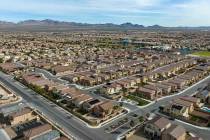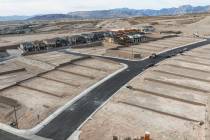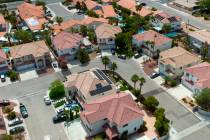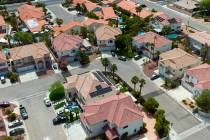Full recovery seen for valley single-family homes by 2011
Home prices will decline another 5 percent to 10 percent in Las Vegas this year, but sales volume will turn around in 2010 and structural demand for 23,500 new homes will be reached by 2011, a real estate analyst said Wednesday.
Marta Borsanyi, principal of Newport Beach, Calif.-based Concord Group, forecasts a full recovery for traditional single-family suburban homes by the fourth quarter of 2011. Full recovery is defined as one new-home sale a week in each tract project and low single-digit price appreciation.
Las Vegas is a unique market and doesn't conform to national model projections for housing recovery, Borsanyi said. More than other U.S. metropolitan areas, demand for housing comes from people outside of Las Vegas, primarily retirees, second-home owners and investors, she said.
The pendulum in Las Vegas tends to swing with the number of new hotel rooms opening. With some 15,000 rooms scheduled to come on line in 2009, employment and population will show marginal growth, a key to home sales activity, Borsanyi said.
"No question this is worse than other recessions, but the reason we see light at the end of the tunnel, we know, is because of the number of hotel rooms," Borsanyi said. "They're not going to be mothballed. They're going to market the living daylight out of them."
In a February report on Las Vegas' housing outlook, Concord Group showed an oversupply of 48,000 available units, including standing inventory, available lots and recently built foreclosures. About 11,000 of those are high-density units, the majority of which are condo-hotel units.
Borsanyi examined two models -- demographic growth and hospitality and gaming employment -- to forecast structural demand for new homes, a major element to drive market recovery.
Her projection of 23,500 units is based on the creation of 115,000 new households, or an average of 3.3 percent annual growth, over the next five years. That's lower than all but two years since 1970.
The primary driver of Las Vegas' economy is the hotel and gaming industry. Between 2008 and 2010, about 25,000 hotel rooms are projected to open, or 8,300 a year. That's a significant increase from 6,300 rooms, or 1,050 a year, added from 2002 through 2007, Borsanyi noted.
"You have a unique market where a single employment type generates changes -- the hotel industry," she said. "Detroit was like that with cars, but not anymore. You have a lack of excitement when there are no new attractions. If it was less and less and less, then yes, it could be Detroit. However, in 2009 you get 15,000 new rooms, so it's getting back on a positive track."
Borsanyi said the current recession is affecting the market stronger than previous downturns because job losses in construction outweigh growth in gaming and hospitality. She estimated 1.55 jobs for every new hotel room, based on a random hotel sample of 50,924 rooms with 79,000 employees.
Foreclosures dominate the market, accounting for nearly three-fourths of resale activity in 2008, and that's why prices continue to drop.
Home Builders Research reported median existing-home price at $155,000 in January, a 35.4 percent drop from the same month a year ago. New-home median prices fell 14.6 percent to $234,173.
The threat of future foreclosures continues to depress pricing, Borsanyi said. Nearly half (47 percent) of Nevada mortgages are "upside down," or have negative equity.
Distressed property sales are attractively affordable, another positive demand indicator, she said.
"This is where the smart money buys, so there are opportunities, basically is what we're saying," Borsanyi said. "We shouldn't be crying so much, 'Why is it bad now?' Because it was so good."
Contact reporter Hubble Smith at hsmith@reviewjournal.com or 702-383-0491.
HOME SALES SURGE IN LAS VEGAS, WEST
Home sales in the Western United States surged in January as first-time homebuyers, real estate investors and others seized on bargain-priced foreclosed homes in California, Nevada and Arizona, two reports released Wednesday show.
A total of 74,000 existing homes and condos were sold in January in the 13-state region. Sales were up 32.1 percent from the same month in 2008, without adjusting for seasonal factors, according to the National Association of Realtors.
As has been the trend since last summer, distressed sales continued to fuel sales in the West, and that helped drag down median home prices in the region by almost 26 percent from the prior year to $220,000, the association said.
Las Vegas, Los Angeles, Phoenix, San Diego and San Francisco made up the top five major metro areas in the country to register an increase in home sales last month, according to the Associated Press-Re/Max Monthly Housing Report, released Wednesday. The data include all home sales recorded in the metropolitan statical areas by all local agents, regardless of company affiliation.
In Las Vegas, sales more than doubled versus January 2008 and the median sales price sank more than 36 percent to $149,900.
THE ASSOCIATED PRESS

















